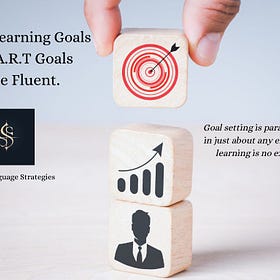The 10 Commandments of Second Language Acquisition
Follow these and watch your second language acquisition progress consistently
Welcome, aspiring polyglot! The other day someone brought up a great point. Having loose (or strict) rules to follow during the education process can provide the perfect guardrails to lead to success. With that in mind, I thought about all of the things that I try to keep in mind when creating lessons, building frameworks, and progressing my own language acquisition. These are the 10 commandments of second language acquisition according to the Second Language Strategies methodology.
1. Add new vocabulary words every single day
The age old debate between vocabulary and grammar will likely never end. Primarily because different things work for different people and, at the end of the day, you need both. That said, without a vocabulary you will never have the chance to practice your grammar, so inundating yourself with new vocabulary on a daily basis is a must.
It could be 5 words, it could be 10 words, it could be 50 words like my students do. Irrespective of what you choose, so long as you are consistent you will see results over time. Write them down, say them aloud, work them into sentences, do everything you can to ensure they are solidified in your memory. That includes returning to them to review weekly so you are not spending time learning things just to forget them.
2. Always ask questions
Reading is one of the best things you can do to bolster your second language acquisition and the reason why may shock you. It is not for the vocabulary or the grammar or the information you are reading about, it’s because it will, theoretically, cause you to start asking questions. Pay attention to how things are worded, ask yourself these questions:
How does it compare to your native language?
Can you move the words around in your native language to emulate the target language? Does it sound awkward if you do?
Are there other ways to express this exact sentiment?
Are there words that resemble words in your native language? What do they mean?
How can you add these things into your lexicon? Is there something you would add or remove to make it sound better?
Where does this word come from? What about this sentence structure?
These are just a few examples you can use to bolster your reading time. At the end of the day, the more you train yourself to question things the easier it will be to maximize your curiosity. If you want to see what that looks like on a more granular level, check out this article:
Curiosity: An Essential Second Language Acquisition Strategy
Welcome, aspiring polyglot! While there are many second language strategies, there are few that compare with the proper weaponization of one's own curiosity. Proper utilization of your natural curiosity will take you far in any field of study, language learning is no exception to this rule. Endeavoring to learn a foreign language is difficult enough, but without curiosity it becomes that much more difficult.
3. Immerse yourself
One of the core tenants of language acquisition is immersion. It could be complete, partial, or simulated, but it needs to be there. When you are learning a new language you need to be exposed to it. The more time you spend exposed to the language the quicker you will reach a point where you are able to speak and hold conversations. For the long and short on simulated immersion environments, be sure to check out this article:
Hacks for Learning a Language Through Immersion Without Breaking the Bank
Welcome, aspiring polyglot! For those of you who have been following along on Twitter (2000+!!!) you will have seen me use the term localized immersion. I have never really explained what it means, though, so that is what I will be doing here. Localized immersion learning is the best way to learn one outside of being actually immersed in a country where…
4. Take every opportunity you get
This is probably the most intimidating aspect of language acquisition, but it is something you must do if you want to be successful. Depending on where you live and what language you are learning you are going to have a variety of opportunities to speak your new language. In order to be successful you need to take as many of these opportunities as possible.
Theory is great, but it is meaningless without practice. It can be extremely difficult to know what you do not know if you neglect practice. When you speak, there is no hiding behind theory. You can either do it or you cannot. If you cannot, you now know what you need to work on and you can devise a plan of attack to destroy any inadequacies.
5. Make mistakes
Hand in hand with taking every opportunity is making mistakes. It may not be the most enjoyable, but learning from your mistakes is certainly the most effective. Most people may think it is great to go the whole time without making any mistakes, but in all likelihood those people are not making mistakes because they are not pushing themselves. There is a huge difference between do what you are good at and do it flawlessly.
Millions of people around the world make mistakes in their native language every single day. Some people make so many mistakes that entirely new words are created and added to dictionaries. Do not fear mistakes, they are part of the game. The more you make now the fewer you will make a year from now when you are speaking your new language with native speakers. However, in order to get to that point you need to have goals.
6. Set goals
Goal setting is paramount for success in almost every aspect of life. Without a target to aim at it can be almost impossible to remember where you are headed. Fortunately, your goals are no longer determined by outside forces like the public education system. You can set your own goals, your own milestones, and your own deadlines. That said, with so much freedom often comes a bit of paralysis through analysis. If that sounds like something you struggle with, check out this article:
Language Learning Goals: Set SMART Goals - Become Fluent
Reach for the Stars The end goal of learning languages tends to be the ability to speak them fluently. While this is an admirable goal, it also is quite vague. What does fluency really mean when learning a new language?Thank you for reading Second Language Strategies. This post is public so feel free to share it.
7. Track your progress
Having goals is great, but you also need to be tracking your progress. Truth is, if you spent years in the gym, but neglected to track the numbers, you left progress on the table. The same goes for learning anything. While I am not a fan of the way public schools go about this, it is an absolutely crucial element in ensuring consistent progress. For more on how we approach progress tracking here at Second Language Strategies, check out this article:
(PDF) Using Logbooks with Second and Foreign Language Learning
Welcome, aspiring polyglot! Though I have mentioned it several times, it bears repeating, you are responsible for your education. Waiting for others will only ever be detrimental and trying to conform to the learning styles of those around you can stunt your growth indefinitely. This is especially true when it comes to learning a new language because th…
8. Be well rounded
One of the most common phrases used by people who tried and gave up on language acquisition is, “I can read and understand the language, but I cannot speak it.” and that, to me, is tragic. It is certainly normal, but if you make the decision to not walk away, you will never experience this particular problem. Being a well rounded learner means attacking each component of second language acquisition.
You cannot just listen to music and watch TV, you need to read, you need to speak, you need to write, you need to translate. When you hit all of these consistently you will slowly begin to think in your target language which will make it exponentially easier to speak your target language. If you are constantly thinking in English, your sentence structure and vocabulary will suffer for it. For more about the components of second language acquisition, check out this article:
What are the 5 Components of Second Language Acquisition?
Understanding Second Language Strategies for Homeschool Families Welcome, aspiring polyglot! There are essentially 5 components that will drive language acquisition for everyone and, while the public schools might touch on these things, they often leave much to be desired. They are, in short:
9. Speak early and often
It is possible that the biggest failure of the public education methodology falls here. Students are rarely, if ever, encouraged to actually speak the language. It does not have to be in the first week, it does not have to be in the second week, but by the third week you should be at the very least speaking two or three sentences every time you sit down to work on your language.
There are plenty of ways to go about this, from reading aloud to writing your own sentences and speaking them. It does not matter where you start, only that you start. Once you can put one sentence together try putting two sentences together. Then try to go for three and four consecutive sentences. Answer questions, ask questions, talk about the things you know and enjoy.
Get used to uncomfortable silence and do not give yourself a way out. It is easy to say, “well, I don’t know, I guess I’ll Google the answer” but easy is not effective. If you do not know the precise way to say something, find another way. Use what you do know to express what you don’t know and then build on it. You can use your basic understanding to improve your precision and eloquence over time.
Again, though, if you are not doing this and making mistakes you will continue to struggle as you fail to understand the issues you have. You may want to feel perfect, but perfection means there is no room for growth. I promise you, even in your native language you have several opportunities for improvement. Have you ever let that stop you from speaking your native language?
10. Go beyond your level
The final commandment from SLS is to always push to go beyond your purported language learning level. I may have said the 9th commandment is where public schools miss the most, but in reality it is more likely this. There is absolutely no reason you should be spending years on end learning to use three verb tenses. You should be able to discuss your hobbies and different current events by the end of year two, not just numbers, colors, and animals.
Irrespective of what you think your language level is, you should be using input that is decidedly above that level. If you are an A1 student, you should be working with B1 input. Staying in A1 material tends to result in staying at the A1 level. If you want to improve you need to be doing progressively more difficult tasks. For more on that, check out this article:
Working Above Your Second Language "Level"
Welcome, aspiring polyglot! Someone the other day told me that there is no way to discuss philosophy after only learning a new language for a few months. While it certainly is not normal, to say it is impossible is just plain wrong. When it comes to second language acquisition, outside of mainstream classrooms the limitations that are placed on you will be placed on you by yourself, not by anyone else.
Conclusion
You are in control of your education now, but that freedom can be suffocating if you don’t know what you are doing. These are our 10 commandments, but if one of them does not work for you, then don’t use it. If you do all of these things, you will become bilingual, but there are more than one path to the destination. Do what works for you, but do not let that act as an excuse to avoid pushing yourself in the realms of speaking, writing, and translating.
As we discuss often around here, creating is vital in second language acquisition. Speaking and practicing with written language will help you in accelerating and enhancing your language learning process, so start having conversations as early on as possible. It will be difficult, but you can do difficult things and be great. So go do some difficult things and become great.
Eager for more Second Language Strategies?
For more content find me on Twitter or Instagram. If you are struggling to get speaking in your target language, get up to 55% off a Babbel subscription using this link. I look forward to seeing everyone’s progress in the months and years to come. Be sure to check out the YouTube channel as well!
Learning Spanish? We have begun aggregating resources in you Spanish Resource Newsletter!
Don't forget to pick up your very own French Language Logbook or Spanish Language Logbook!












